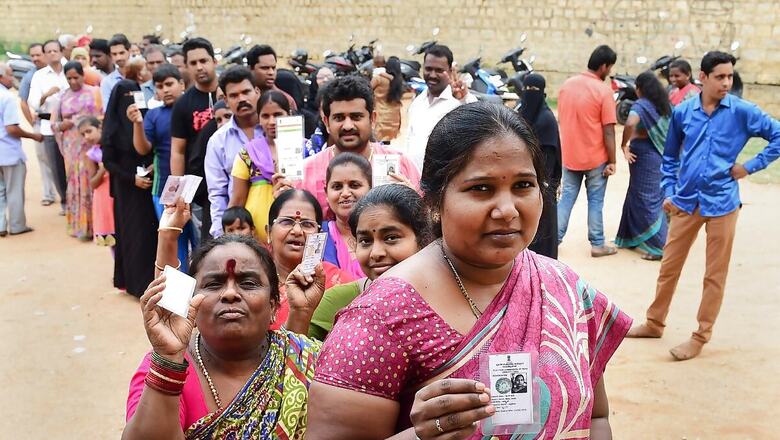
views
Lok Sabha elections in southern India will be held from April 19 to May 13, with Karnataka voting in two phases on April 26 (14 seats) and May 7 (14 seats), Tamil Nadu on April 19, Andhra Pradesh on May 13, Kerala on April 26 and Telangana on May 13 as per the parliamentary polls schedule announced by the Election Commission of India on Saturday. The Union Territory of Puducherry will vote on April 19. The Lok Sabha election results 2024 will be out on June 4 when the counting of votes takes place across India.
- Karnataka — April 26 (14 seats) and May 7 (14 seats)
- Tamil Nadu — April 19
- Andhra Pradesh — May 13
- Telangana — May 13
- Kerala — April 26
- Counting of votes on June 4, 2024
Andhra Pradesh will simultaneously vote in Assembly polls on May 13 and the counting of votes will be held alongside the general elections counting on June 4, 2024.
The BJP is gunning for a third consecutive term for Narendra Modi as Prime Minister, while the opposition has put up the Indian National Developmental Inclusive Alliance (INDIA) to challenge him. The bloc, however, has not declared a prime ministerial candidate. The BJP currently has 290 seats in the lower house, while its main rival, the Congress, has 48.
The five southern states along with the Union Territory of Puducherry, which has one constituency, account for 130 of the total 543 Lok Sabha seats. Tamil Nadu has 39 seats in the Lower House of Parliament, while Karnataka has 28. Andhra Pradesh accounts for 25 seats in the Lok Sabha and Kerala for 20. Telangana sends 17 MPs to the Lower House.
The BJP was unable to win any seat in Andhra Pradesh, Tamil Nadu and Kerala besides Puducherry in 2019. It had though swept Karnataka by winning 25 of its 28 seats and made impressive gains in Telangana by bagging for the first time four of its 17 seats.
Tamil Nadu has 39 Lok Sabha seats, including 32 unreserved and seven reserved for Scheduled Caste candidates. In the 2019 elections, the DMK-led Secular Progressive Alliance recorded an overwhelming victory, winning 38 out of the 39 seats.
With the DMK joining the INDIA bloc and the BJP-led National Democratic Alliance (NDA) losing the support of the AIADMK, the state’s political landscape has been significantly altered ahead of the 2024 Lok Sabha polls.
In Karnataka, after being ousted from power by the Congress in the 2023 Assembly polls, the BJP now is making a strong bid to regain the lost ground.
The BJP won 25 out of total 28 seats in the previous elections, and had ensured the win of a party supported Independent candidate in Mandya. The then ruling Congress-JD(S) alliance had come a cropper winning just one seat each.
It is a role reversal of sorts for JD(S), which joined the NDA last September and has forged an electoral alliance with the BJP. The regional party is expected to contest in three seats — Mandya, Hassan and Kolar.
In Andhra Pradesh, the BJP, TDP and Pawan Kalyan’s Jana Sena are contesting the Lok Sabha and Assembly polls together. Back in 2014, when TDP and BJP fought the polls together, Jana Sena was their outside ally.
As per their seat-sharing formula for 2024, the BJP will contest six Lok Sabha and 10 Assembly seats, while the TDP will fight 17 parliamentary and 144 state seats. Under the deal, Pawan Kalyan’s Jana Sena will contest two Lok Sabha and 21 Assembly seats. The state has 25 Lok Sabha and 175 Assembly seats.
The YSR Congress had swept the 2019 elections with 151 seats in the 175-member Assembly and 22 of the 25 Lok Sabha seats. It had received a staggering 49.9% (Assembly) and 49.1% (Lok Sabha) vote share.
In Telangana, the Congress had won three out of the 17 Lok Sabha seats in 2019. All three MPs, including current chief minister A Revanth Reddy, contested the recent assembly elections and won. The K Chandrashekar Rao-led BRS won nine seats in 2019, while the BJP bagged four. Asaduddin Owaisi’s AIMIM had retained one seat.
In Kerala, the Congress had won 15 seats in the 2019 elections. The Congress-led UDF and the CPI(M)-led LDF are the two major traditional players in the state politics.
But this time, the BJP has welcomed prominent Christian figures like Anil K Antony, son of Congress stalwart A K Antony, and seasoned Kerala politician P C George, into its fold. Additionally, the party is leveraging Prime Minister Narendra Modi’s frequent visits to Kerala, emphasising developmental agendas tailored to the state’s needs.




















Comments
0 comment